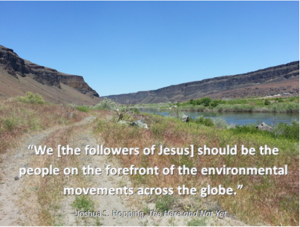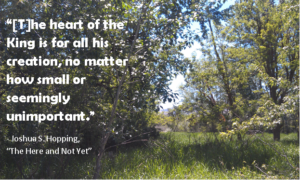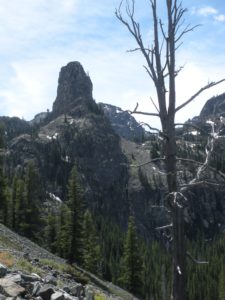 It is a sad but true reality that many of the followers of Jesus do not take care of the creation the Creator King made. Instead, they quote selected Bible verses, chosen to support their view that what they do to the environment (biological and geological) does not matter. After all, it is all going to burn anyway. Or so goes the standard view of a lot of Christianity today. In stark opposition to this view is the concept of Kingdom Theology which declares that the rule and reign of the King over every area of life and everything, created or uncreated, invisible or visible.
It is a sad but true reality that many of the followers of Jesus do not take care of the creation the Creator King made. Instead, they quote selected Bible verses, chosen to support their view that what they do to the environment (biological and geological) does not matter. After all, it is all going to burn anyway. Or so goes the standard view of a lot of Christianity today. In stark opposition to this view is the concept of Kingdom Theology which declares that the rule and reign of the King over every area of life and everything, created or uncreated, invisible or visible.
Time itself began with the Creator King declaring that everything was good. The dirt was good; the animals of the land, sea and sky were good; the trees, grass, and plants that covered earth was good. Everything that was made or would be made was good. This declaration of the King of Kings has never been revoked. It is a fact that God made this planet and all other planets across the galaxies of the vast skies, simply because he wanted to. He found joy in creating things that no eye, animal or human, would ever see. And he declared it all good. Things did change when Adam and Eve decided to try to rule things themselves, as we have seen. Despite the entrance of sin, evil and death into the creation, the essence of creation remained good.
Sadly, as the years rolled by, the creation was ground down by sin and evil. Things that were beautiful became deadly; elements that were to bring life, instead brought death. The struggle for survival overtook every plant, animal, and biological cell, as each fought for life. Each day since the entrance of sin and evil into the land, the land has groaned for the arrival of the day of the Lord when everything would be set right (Romans 8:19-25).
Into this messy world came the King himself, taking on the very flesh of his creation. In doing this, as we have seen, the Creator King ushered in the new age of life. Now, when his followers pick up a piece of trash on the side of the road, they are declaring that the kingdom of God has come and brought redemption to that piece of land, no matter how small. The selfless act of a child of the King has come against and defeated the selfish act of sin that caused someone to throw that piece of trash on the ground. It is a spiritual battle being fought in what looks like a simple act of picking up a piece of trash.
If this seems too radical, please consider that one of the reasons why God took the people of Israel out of the Promised Land was because they failed to give the land rest. One of the laws given to the people of Israel while in the desert with Moses was that every seven years they were to let the land rest. No plow was to turn the soil; no garden was to be planted or orchard pruned. This was to be the Sabbath year in which the people would trust the Creator King to provide the daily sustenance for them. Sadly, the people of Israel found this command too hard, so they as a group refused to follow it, leading them to the day when the King removed them from the land so that the land could rest (2 Chronicles 36:21).
 The Book of Ezekiel also tells us that the Creator King was upset at the people of Israel for defiling the land through “their conduct and actions” (Ezekiel 36:17). Specifically, God was telling the people that their worship of idols and misconduct (i.e. the spilling of blood in the land through murder, human sacrifice, injustice and war), was harming the environment around them. The land itself had become defiled and, therefore, God was going to have them removed for a period of time. Later on, after the land had rested and the people have repented, the Creator King would bring the people of Israel back into the Promised Land and make it plentiful again with an abundance of grain, crops, and fruit (Ezekiel 36:24–36).
The Book of Ezekiel also tells us that the Creator King was upset at the people of Israel for defiling the land through “their conduct and actions” (Ezekiel 36:17). Specifically, God was telling the people that their worship of idols and misconduct (i.e. the spilling of blood in the land through murder, human sacrifice, injustice and war), was harming the environment around them. The land itself had become defiled and, therefore, God was going to have them removed for a period of time. Later on, after the land had rested and the people have repented, the Creator King would bring the people of Israel back into the Promised Land and make it plentiful again with an abundance of grain, crops, and fruit (Ezekiel 36:24–36).
I tell you this because I want you to know how much the Creator King cares for his creation. He doesn’t just care for humanity, though humanity is his prime creation within whom he breathed his very soul. No, the heart of the King is for all his creation, no matter how small or seemingly unimportant. We, the followers of Jesus alive today, should be warned by the example of the people of Israel, and start taking care of the land and animals around us. We should be the people on the forefront of the environmental movements across the globe, planting trees, picking up trash, and finding sustainable ways of building things.
Sadly, people have bought into the lie that to take care of the environment is not to care for humanity. They think it is a zero sum game in which one side has to win no matter what. However, if we take a step back and look at the amount of resources we use in a given day or year, we will find that we typically consume way too much. This is especial true for us in the United States, where our very economy is built upon hyper consumption without a thought of waste or where those resources come from. This needs to change; it has to change as the Creator will protect his creation one way or another.
[box] An excerpt from my book, The Here and Not Yet (Vineyard International Publishing, 2017), pages 195-197.
Additional information on the topic of Environmental Stewardship can be found in the following three books:
- Saving God’s Green Earth: Rediscovering the Church’s Responsibility to Environmental Stewardship by Tri Robinson
- Tending to Eden: Environmental Stewardship for God’s People by Scott C. Sabin
- Green Revolution: Coming Together to Care for Creation by Ben Lowe. [/box]


 The above question was recently posed to me by a friend and it made me stop and think for a bit. Is there something inherent in Kingdom Theology that accounts for the problem of evil (i.e. theodicy)? And if so, what is it? It was – and is – a very good question.
The above question was recently posed to me by a friend and it made me stop and think for a bit. Is there something inherent in Kingdom Theology that accounts for the problem of evil (i.e. theodicy)? And if so, what is it? It was – and is – a very good question. I think it is very important to stop for a moment and ask the question that the early church had to ask itself: “With all the different versions of the kingdom of God, why believe Jesus’ version? What was it that made his claims different than all the other claims out there?” The New Testaments gives us two answers as to why the first-century followers of Jesus took his word over and above the words of all the other voices of their time. These answers are also the ones that we, in the twenty-first century, must hold on to, as they are what set us apart, not only from other definitions of the kingdom of God, but from all other religions.
I think it is very important to stop for a moment and ask the question that the early church had to ask itself: “With all the different versions of the kingdom of God, why believe Jesus’ version? What was it that made his claims different than all the other claims out there?” The New Testaments gives us two answers as to why the first-century followers of Jesus took his word over and above the words of all the other voices of their time. These answers are also the ones that we, in the twenty-first century, must hold on to, as they are what set us apart, not only from other definitions of the kingdom of God, but from all other religions. I’m happy to announce that my book,
I’m happy to announce that my book,  The writing bug has hit me hard this week… so I took yesterday off work and spent the morning at a local coffee shop writing.
The writing bug has hit me hard this week… so I took yesterday off work and spent the morning at a local coffee shop writing. I know it is risking as the term “mystic” is seen in a negative light by a lot of folks within the American Christian culture. Yet when I wrote the biography for my upcoming book, I called myself a “Christian mystic.”
I know it is risking as the term “mystic” is seen in a negative light by a lot of folks within the American Christian culture. Yet when I wrote the biography for my upcoming book, I called myself a “Christian mystic.”
 “We need to realize that not only is psychology not a substitute from spirituality, but spirituality is not a substitute for psychology. While most Christians would not tend to make the first assertion, many would and do tend to make the second…
“We need to realize that not only is psychology not a substitute from spirituality, but spirituality is not a substitute for psychology. While most Christians would not tend to make the first assertion, many would and do tend to make the second… r on this week!! =D
r on this week!! =D